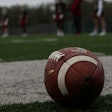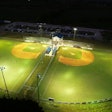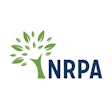Copyright 2017 Collier County Publishing Company
All Rights Reserved
Naples Daily News (Florida)
Exposure to secondhand smoke is harmful to all ages but especially kids, because they breathe more rapidly and absorb more pollutants.
If you must smoke, walk away from the Little League game.
Young lungs need to avoid secondhand smoke.
Tobacco Free Collier has joined forces with the Blue Zones Project to reduce kids' exposure to secondhand smoke at parks and ballfields operated around the county, said Robert Ostbye, the tobacco prevention specialist overseeing the program at the Florida Department of Health in Collier County.
The program has secured 150 signs that are being installed at parks that urge people to "please keep this area tobacco free" by not smoking or using electronic cigarettes where kids are playing.
The signs cost a little more than $2,300, and employees with the county's parks and recreation division are installing them around ballfields, splash pads, hard courts and playgrounds.
Since the Blue Zones Project was launched as a community initiative to improve residents' health, project leaders have been active with the tobacco free organization to establish short- and long-term tobacco policy objectives, Ostbye said.
"One of those original objectives was to establish voluntary smoke-free areas at county parks and recreation facilities," Ostbye said. "The opportunity to work with the county's parks and recreation department on these signs originated from a meeting between (the) county and Blue Zones Project staff."
County parks and recreation staff were on board to look at signs, and the project was a go, he said.
The Blue Zones Project of Southwest Florida was introduced to the region in 2015 based on the world travels of Dan Buettner, who identified communities where people share lifestyle traits and live to 100 or older. He wrote a New York Times best-seller outlining principles of longevity.
The community-wide undertaking involves voluntarily implementing health-focused changes in workplaces, schools, government entities, restaurants, grocery stores and physical settings so healthier choices are easier and become a way of life.
The signs can only ask people to please keep areas smoke-free around children in parks, because an outright smoking ban is outside the authority of local governments, he said.
On the other hand, private employers are increasingly prohibiting smoking on their grounds, and some employers decline to hire smokers.
Exposure to secondhand smoke is harmful to all ages but especially kids, because they breathe more rapidly and absorb more pollutants. More than 7,000 chemicals are found in secondhand smoke; at least 250 of those are toxic and 70 of them can cause cancer, according to the U.S. Centers for Disease Control and Prevention in Atlanta.
Kids exposed to secondhand smoke are more likely to have under-developed lungs and suffer more bouts of bronchitis and pneumonia, the CDC says.
Secondhand smoke can trigger asthma attacks in children, and they are prone to more ear infections and fluid buildup requiring ear tubes to drain the fluid.
The American Academy of Pediatrics says children of smokers have a harder time getting well from colds and tend to miss more school.
Over the long term, children of smokers are more likely to develop the habit themselves, the pediatrics group reports.
Funding for the signs came from the state's tobacco settlement with the major tobacco companies reached in 1997, with Florida voters deciding in 2007 to establish Tobacco Free Florida to educate residents about the widespread harms of tobacco use.
Tobacco Free Collier receives $183,000 a year from the settlement to fund a variety of prevention, to operate a youth anti-tobacco campaign and for tobacco cessation tools.
Here are some tips for parents to protect their children from secondhand smoke:
Do not allow anyone to smoke anywhere in or near your home.
Do not allow anyone to smoke in your car, even with a window down.
Make sure your children's day care centers and schools are tobacco-free.
If your state still allows smoking in public areas, look for restaurants and other places that do not allow smoking. "No-smoking sections" do not protect you and your family from secondhand smoke.
Exposure to secondhand smoke is harmful to all ages but especially kids, because they breathe more rapidly and absorb more pollutants.
Read More of Today's AB Headlines
Subscribe to Our Daily E-Newsletter
Terms and Conditions Privacy Policy



































